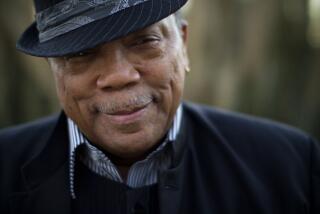Michael Jackson had several drugs in his system when he died
When he died, Michael Jackson had a cocktail of anti-depressant and mood drugs in his system as well as a level of the anesthetic propofol typical of a patient undergoing major surgery.
The revelation came during testimony Monday in the lawsuit Jackson’s mother and children have filed against AEG, the entertainment giant that was promoting the singer’s comeback concert series in London when he died.
Dr. Christopher Rogers, the Los Angeles County deputy medical examiner, testified that after toxicology tests found Jackson had used propofol, he consulted with an anesthesiologist. Dr. Selma Calmes wrote that when the drug is used, a slew of medical devices should be on hand to monitor the patient in case he or she stops breathing.
“The most essential monitor is a person trained in anesthesia and in resuscitation who is continuously present and not involved” in the procedure, her report said.
Dr. Conrad Murray, who was convicted of involuntary manslaughter for giving Jackson a fatal dose of propofol, was a cardiologist who used little of the equipment Calmes listed.
The Jacksons argue that AEG negligently hired and supervised Murray. The doctor, they say, did the company’s bidding by pushing the entertainer to perform despite his frail health, because of his own desperate financial problems.
AEG, however, argues Jackson hired Murray and that the $150,000 a month the company was supposed to pay the doctor were really advances it gave the entertainer.
In the opening rounds of the trial, the family’s attorneys have been striving to show that Murray was incompetent while offering jurors an unvarnished look at the singer’s final days, including his use of prescription drugs. A paramedic called by the Jackson attorney testified that when he first saw Jackson on his bed, he resembled an end-stage cancer patient.
Dan Anderson, a toxicologist with the coroner’s office, testified that Jackson’s blood, urine and internal organs showed traces of the anti-anxiety drugs Valium and Lorazepam, the short-term anesthetic midazolam and lidocaine, which can be used along with propofol.
Anderson said investigators found injectable Lorazepam at Jackson’s home as well, a form of the drug “typically found in a hospital setting.”
Anderson also testified that Jackson was the only person in Los Angeles County who was not a doctor or nurse to die of propofol intoxication at their home in the last 14 years.
Rogers reviewed his autopsy, and a black-and-white photo of the naked singer laid out in the coroner’s office was flashed briefly on a screen in the courtroom.
The deputy medical examiner testified that the 5-foot-9 Jackson weighed 136 pounds when he died and that X-rays showed he suffered from arthritis in his lower spine and fingers.
He had a pink tattoo on his lips and dark tattoos on his eyebrows and on the front of his scalp.
He also testified Jackson suffered from vitiligo, a disease more common in African Americans, in which some areas of the skin are light and others are dark. “It can be very disfiguring,” Rogers said.
Although Rogers found that Jackson suffered from maladies that other 50-year-old men might have, such as an enlarged prostate, the autopsy found nothing that would lead to his premature death.
More to Read
Sign up for Essential California
The most important California stories and recommendations in your inbox every morning.
You may occasionally receive promotional content from the Los Angeles Times.











